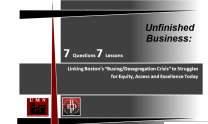39 Years Later
Friday, June 21st marks the 39th anniversary of Morgan V. Hennigan, the federal court order given by Judge W. Arthur Garrity to desegregate Boston’s public schools. To kick off our countdown to the 40th anniversary of school desegregation in 2014, we are posting some resources and learnings about this court order. Below, you can read our Project Director Donna Bivens’ thoughts and reflections on what we’ve learned. This section also includes:
– resources on the order, including a link to the full order and a summary of the order we’ve put together; If you haven’t read it we
– Voices from our story collection – people’s reflections on what the order meant from their perspective
*****
As we approach the 39th anniversary of the release of the Morgan v Hennigan decision by federal court Judge Arthur Garrity, we at BBDP have been reflecting a lot on the countdown to 2014 and the end of this project looking back at Boston’s busing/desegregation crisis. We’ve learned more than we could have imagined about this city and the many people in it committed to this relationship between love and justice.
Over the next few days until the anniversary, we will be posting — interviews of elders doing racial justice work as a part of their work for love and justice in commemoration of that decision. We won’t expect you to agree with everything they say but we hope you will join your story with theirs as a way to help find a new narrative about where we are and where we are going that can hold more and more of us. Especially if you have another perspective or experience, we ask that you hold a story circle between now and the end of 2013 with others who see it your way.
For my part, it has been one of the most challenging endeavors I have been a part of — let alone “directed”. The short story I’m telling myself is follows.
I was invited into the project by UMN director Horace Small. Horace had heard in UMN’s CORI organizing and from its attempts to organize Black parents to get more involved in the fight for quality education for all that there was unfinished business around Boston’s difficult desegregation history. Drawing and acting (as he most often does) on the combination of his intuition and his determination to act for justice, Horace invited me into UMN to do a “truth and reconciliation” process to acknowledge and address those wounds.
I quickly invited Jacqui Lindsay into the project because I knew how much she loves ambitious projects and how many skills she has to accomplish them. Jacqui was a quick convert and joined in with her typical enthusiasm and unbridled optimism.
The first year, studying the era and trying to get see if people thought the project was an important one to do (click HERE for a full report of the exploratory phase of BBDP). We got strong affirmation from a wide diversity of people with the only caveat being that it had to be inextricably linked to today.
It also became clear that it was not just an issue of the Black people and impoverished people that bore the brunt of the trauma. It was of concern to many Bostonians across race, class, nationality, position etc.
As we approached the second phase of the project, Meghan Doran came on staff. In addition to her many gifts, Meghan brought at least three much needed identities for the Project: youth, whiteness and Irish heritage. Together we embarked on “Phase One” of the Project with the aim of asking as many people as we could what was the relevance of that era for today and inviting them to be a part of it. We used the film Can We Talk? produced by Scott Mercer for UMN to open many conversations. We also convened different groups to better understand the relevance of that period to Latinos and Asians.
With all that we heard we discerned three patterns that people saw as raised but not addressed then but showing however differently (click HERE for a full report of Phase One of BBDP)
- Racial and class equity
- Democratic access to resources and decision-making and
- Demanding excellence of public institutions
Just as we were preparing to enter into the second phase of collecting stories, however, a new initiative to change the school assignment policy was announced by Mayor Menino. Our mandate that the project stay relevant to today forced us to get involved in the action. Clearly, it was directly related as we even heard the same words describing it or in the debates over it: neighborhood schools, quality, residential segregation, rights, etc. The two concepts that were conspicuously marginalized, if not taboo, were race and class and no one ever mentioned systemic racism and class inequity. So on this the week of the 39th anniversary of the decision and countdown to the 40th anniversary of the crisis, we want to lift up some voices from that era who were unashamedly facing into racial justice. If this is not “your issue” but you are committed to addressing any of the three patterns named, we hope you will listen to some or all of these interviews. You will hear young people fully engaged with their elders, listening and learning but knowing this is not meant to displace their own current lived reality. We also hope you will read or reread the order and complaint.
The school assignment process was one of the most disempowering processes I ever participated in. That is not a critique of anyone and I know a lot of the people designing it care as much or more about love and justice as I do. I also imagine some were uplifted by it though most of those I know were not. It was dispiriting for me because it was not aimed at popular education and was very ethnocentric in design and connection. Coming more out of popular education and theological education in my politics, mainstream politics is not my realm of change-making. I don’t know a lot about it or put most of my energy there. I’ve learned so much from Horace and others at UMN for whom it is their area of expertise and I know how important mainstream politics are. But I do not believe it is the place from which the change that includes us all will emanate. It is the ground of conflict, and compromise and privilege rules there. Too often it does not recognize or value the realm of inclusion and belief in the wisdom of all or the fact that WE (as in all of us) are smarter together—which is what I believe.
So for this anniversary and for the countdown to 2014, BBDP is privileging the voices that aren’t often heard or I should say listened to and given weight. This week, we’ll focus on voices who were committed specifically to racial justice “back then”, We’ll post the entire interview for those who want and have time to go deep but we’ll also include snippets that speak to the decision and the racial justice aspects of that part of the history. You’ll be hearing young people interviewing these veterans and elders. We’ll start today with the voice of a veteran of the fight for racial justice who has worked tirelessly both within the system as a decision maker and marginalized within in as one agitating for change. Barbara Fields career in education started in the midst of this and she continues to work for love and justice in education as a retired outsider. Her interview tells a story of the desegregation order that many do not know and have not fully learned from.
At the start of the school initiative process, State Representative and historian Byron Rushing implored everyone beginning that process to read the order. I’m not sure how many did then, but I hope as you follow along with BBDP’s culmination that you’ll read it and engage it and wonder with us how it is relevant to those of us seeking racial justice. Summer intern Fabrice Montissol has written a short summary of the 50plus page decision. Hopefully it will entice you to read or reread this important document.
This fall, we will have a special story circle that will focus on the class equity issues and bring together the Irish American and African American working class people and their allies.
Thank you for being on this journey with us and for your steadfast support.

Note: I would like to thank Hyams Foundation, UMN’s Howard Rye Fellows, United for a Fair Economy, and Network Immigrants and African Americans and the BBDP Leadership Committee for recent encounters that inspired me to write this post.









Hi, I’m pleased to see that UMN is keeping ALL people of Massachusetts of Boston informed about what was said, done, and how our children where mistreated during this busing era..it was horrible, but one thing I remember is meeting my sisters and brothers from different neighborhoods, that’s how we became friends and to protect each other. I’m an adult over 50 now and I hope that NO other children in the upcoming century will ever have to be treated like that again. MY GOD BE THE GLORY! Ms. C. Boseman
[…] 39 Years Later […]